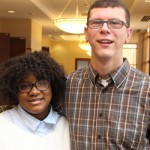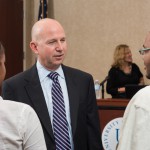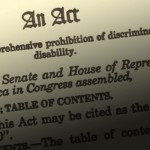
Posted on August 19, 2016
The numbers are concerning. The percentage of children with autism in Delaware schools has more than tripled over the past 12 years and services have failed to keep up. Families report waiting more than a year to receive an accurate diagnosis after they first notice symptoms. And 62 percent of children under five had to see at least three different clinicians before autism was identified.
Why is it still so hard for people with autism and their families to receive
This entry was posted in autism, Center for Disability Studies, developmental disabilities, employment, people with disabilities, training, Uncategorized, University of Delaware and tagged Autism Delaware, Blueprint for Collective Action, CDS video, Delaware Department of Education, Delaware Department of Public Health, Delaware Family Voices, Delaware Network for Excellence in Autism (DNEA), Delaware schools, Leadership Education in Neurodevelopmental Disabilities (LEND), Nemours/A.I. DuPont Hospital for Children.

Posted on February 25, 2016
Question: How many times in the 15 debates for president have moderators specifically asked candidates about issues concerning disability?
a. 1 b. 5 c. 7 d. 11
If you answered b or c, thinking five or seven times sounds about right and should seem reasonable to the one-in-five people watching the debates who have a disability (and the more than 50 million Americans who live with a disability), you’re mistaken. The answer is “a” – one time. In September,
This entry was posted in accessibility, Americans with Disabilities Act, autism, Education, employment, Health and Wellness, inclusion, people with disabilities, public policy, Uncategorized and tagged Alzheimer's, autism, Ben Carson, Bernie Sanders, Convention on the Rights of Persons with Disabilities, Donald Trump, Hillary Clinton, Individuals with Disabilities Education Act, Jeb Bush, John Kasich, Marco Rubio, presidential debates, Social Security Disability Insurance Program, Ted Cruz, Tom Harkin.

Posted on October 23, 2015
Janell Booker connected with a shoe retailer and Zach Martin with a U.S. senator’s district office as part of Disability Mentoring Day in Delaware. Here’s what the students, who are enrolled in UD’s Career and Life Studies Certificate (CLSC) program for people with intellectual disabilities, had to say about their experiences.
Janell Booker
For this year’s Disability Mentoring Day, I went to New Balance, a sneaker store. I really enjoy sports and exercising and last year I spent Disability Mentoring
This entry was posted in accessibility, Education, employment, inclusion, intellectual Disabilities, people with disabilities, self-advocacy, Uncategorized and tagged Career and Life Studies Certificate (CLSC) program, Carpenter Sports Building, Disability Mentoring Day, New Balance, President Barack Obama, Senator Chris Coons.

Posted on October 16, 2015
On Oct. 21, the University of Delaware will continue its annual tradition of facilitating Disability Mentoring Day, a national event that encourages people with disabilities to envision their careers and connect with members of the business community. For the second year in a row, UD has collaborated with state leaders, educators and self-advocates to expand the day’s activities. Students and employers from New Castle, Kent and Sussex counties will be participating this year.
While Disability Mentoring Day is certainly meaningful,
This entry was posted in accessibility, Center for Disability Studies, Education, employment, inclusion, people with disabilities, Uncategorized and tagged Disability Mentoring Day, Division of Vocational Rehabilitation, Governor Jack Markell, U.S. Department of Labor, University of Delaware, WIOA, Workforce Innovation and Opportunity Act.

Posted on October 13, 2015
Now that the ballyhoo behind the silver anniversary of the Americans with Disabilities Act has died down, please allow me (with considerable regret – believe me) to voice this uncomfortable truth: The ADA, landmark legislation though it is, capable at any turn of protecting the rights of people with disabilities, continues to spawn negative consequences.
As Dr. Ronald Meinert and Francis K. O. Yuen noted in their book, “Controversies and Disputes in Disability and Rehabilitation,” the ADA trivializes real
This entry was posted in accessibility, Americans with Disabilities Act, civil rights, community living, employment, inclusion, people with disabilities, transportation, Uncategorized and tagged ADA, Americans with Disabilities Act, Bragdon v. Abbott, challenging disabilities, Dr. Ronald Meinert, Francis K. O. Yuen, invisible disabilities, marginal disabilities, non-competitive jobs, U.S. Supreme Court, vocational rehabilitation.






